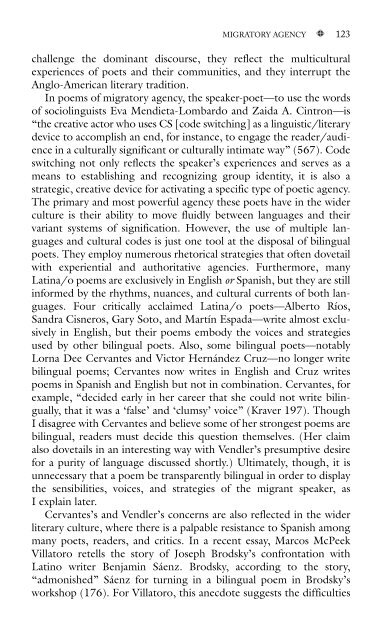american political poetry in the 21st century - STIBA Malang
american political poetry in the 21st century - STIBA Malang
american political poetry in the 21st century - STIBA Malang
Create successful ePaper yourself
Turn your PDF publications into a flip-book with our unique Google optimized e-Paper software.
MIGRATORY AGENCY 123<br />
challenge <strong>the</strong> dom<strong>in</strong>ant discourse, <strong>the</strong>y reflect <strong>the</strong> multicultural<br />
experiences of poets and <strong>the</strong>ir communities, and <strong>the</strong>y <strong>in</strong>terrupt <strong>the</strong><br />
Anglo-American literary tradition.<br />
In poems of migratory agency, <strong>the</strong> speaker-poet—to use <strong>the</strong> words<br />
of sociol<strong>in</strong>guists Eva Mendieta-Lombardo and Zaida A. C<strong>in</strong>tron—is<br />
“<strong>the</strong> creative actor who uses CS [code switch<strong>in</strong>g] as a l<strong>in</strong>guistic/literary<br />
device to accomplish an end, for <strong>in</strong>stance, to engage <strong>the</strong> reader/audience<br />
<strong>in</strong> a culturally significant or culturally <strong>in</strong>timate way” (567). Code<br />
switch<strong>in</strong>g not only reflects <strong>the</strong> speaker’s experiences and serves as a<br />
means to establish<strong>in</strong>g and recogniz<strong>in</strong>g group identity, it is also a<br />
strategic, creative device for activat<strong>in</strong>g a specific type of poetic agency.<br />
The primary and most powerful agency <strong>the</strong>se poets have <strong>in</strong> <strong>the</strong> wider<br />
culture is <strong>the</strong>ir ability to move fluidly between languages and <strong>the</strong>ir<br />
variant systems of signification. However, <strong>the</strong> use of multiple languages<br />
and cultural codes is just one tool at <strong>the</strong> disposal of bil<strong>in</strong>gual<br />
poets. They employ numerous rhetorical strategies that often dovetail<br />
with experiential and authoritative agencies. Fur<strong>the</strong>rmore, many<br />
Lat<strong>in</strong>a/o poems are exclusively <strong>in</strong> English or Spanish, but <strong>the</strong>y are still<br />
<strong>in</strong>formed by <strong>the</strong> rhythms, nuances, and cultural currents of both languages.<br />
Four critically acclaimed Lat<strong>in</strong>a/o poets—Alberto Ríos,<br />
Sandra Cisneros, Gary Soto, and Martín Espada—write almost exclusively<br />
<strong>in</strong> English, but <strong>the</strong>ir poems embody <strong>the</strong> voices and strategies<br />
used by o<strong>the</strong>r bil<strong>in</strong>gual poets. Also, some bil<strong>in</strong>gual poets—notably<br />
Lorna Dee Cervantes and Victor Hernández Cruz—no longer write<br />
bil<strong>in</strong>gual poems; Cervantes now writes <strong>in</strong> English and Cruz writes<br />
poems <strong>in</strong> Spanish and English but not <strong>in</strong> comb<strong>in</strong>ation. Cervantes, for<br />
example, “decided early <strong>in</strong> her career that she could not write bil<strong>in</strong>gually,<br />
that it was a ‘false’ and ‘clumsy’ voice” (Kraver 197). Though<br />
I disagree with Cervantes and believe some of her strongest poems are<br />
bil<strong>in</strong>gual, readers must decide this question <strong>the</strong>mselves. (Her claim<br />
also dovetails <strong>in</strong> an <strong>in</strong>terest<strong>in</strong>g way with Vendler’s presumptive desire<br />
for a purity of language discussed shortly.) Ultimately, though, it is<br />
unnecessary that a poem be transparently bil<strong>in</strong>gual <strong>in</strong> order to display<br />
<strong>the</strong> sensibilities, voices, and strategies of <strong>the</strong> migrant speaker, as<br />
I expla<strong>in</strong> later.<br />
Cervantes’s and Vendler’s concerns are also reflected <strong>in</strong> <strong>the</strong> wider<br />
literary culture, where <strong>the</strong>re is a palpable resistance to Spanish among<br />
many poets, readers, and critics. In a recent essay, Marcos McPeek<br />
Villatoro retells <strong>the</strong> story of Joseph Brodsky’s confrontation with<br />
Lat<strong>in</strong>o writer Benjam<strong>in</strong> Sáenz. Brodsky, accord<strong>in</strong>g to <strong>the</strong> story,<br />
“admonished” Sáenz for turn<strong>in</strong>g <strong>in</strong> a bil<strong>in</strong>gual poem <strong>in</strong> Brodsky’s<br />
workshop (176). For Villatoro, this anecdote suggests <strong>the</strong> difficulties










